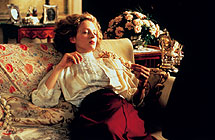|
|
|
|
The
Golden Bowl
|
 |
|
Since the breakthrough success of Heat and Dust (1982), the prolific team of director James Ivory, producer Ismail Merchant and writer Ruth Prawer Jhabvala has walked a perilous tightrope in relentless pursuit of a niche market. On the one hand, their fine-looking, stately adaptations of literary classics and biographies of famous people can too easily seem like empty anachronisms, mere museum pieces (as happened with Jefferson in Paris [1995]). On the other hand, when they can find the tensions inside these handsome, cloistered worlds – sexual repression, conflicts of class and national cultures – they are capable of creating terrific work, as in The Remains of the Day (1993) and A Soldier's Daughter Never Cries (1998). The Merchant Ivory films, as they are now universally known, have come to a sorry and paradoxical pass. A certain rather undemanding sector of the film-going population seems to lap up almost anything bearing this imprimatur, as long as it flatters a middlebrow taste for high art in concentrated, easily consumable doses. By the same token, these films are unfairly reviled in other, supposedly hipper sectors, their art and craft brutally overlooked. The Golden Bowl, adapted from Henry James' novel, is neither the best nor the worst of the Merchant Ivory slate. The filmmakers once again get the opportunity to rehearse James' careful distinctions between European and American manners – and the quiet tragedies that result from their intersection. The film becomes most intriguing when placed in an imaginary double bill with Wong Kar-wai's In the Mood for Love (2000). Both stories are about the transgressive intertwining of two couples; both rest on the repression of truth and the maintenance, at the highest cost, of social appearances. Adam Verver (Nick Nolte) is deeply attached to his daughter, Maggie (Kate Beckinsale), but is obliviously happy to see her married to the shifty Prince Amerigo (Jeremy Northam). Charlotte (Uma Thurman), Amerigo's past lover, finds a perverse and fraught way of maintaining their bond – she marries Adam. I have not read the novel, so I did find myself wondering at times what subtleties and inner, mental processes Ivory was unable to express in his staging of the action. The film sometimes seems like a painterly tableau without an explanatory legend – and without those underlying layers even the most psychologically intricate piece of literature can seem like a banal soap opera when enacted. The story's central metaphor – the golden bowl with its almost undetectable flaw, which plays a major part in the unravelling of the entire situation – is too heavy-handed a device when baldly visualised and physically placed between characters during their weighty exchanges. None the less, The Golden Bowl is a uniformly well acted and occasionally gripping adaptation, with particular force at the end. It is not in the class of Martin Scorsese's The Age of Innocence (1993) but, then again, few films are. MORE Merchant Ivory: Cotton Mary, Le Divorce, Lumière and Company, Feast of July MORE stately literary classics: Mansfield Park © Adrian Martin December 2001 |
![]()